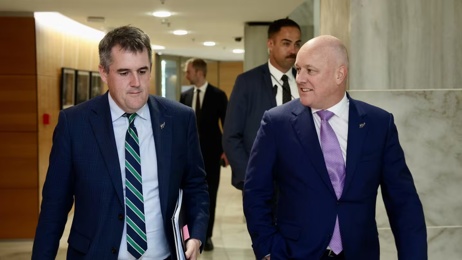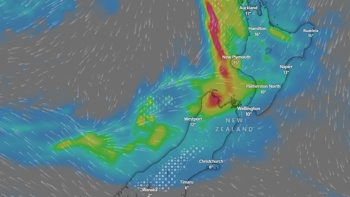UPDATED: 8.56am Budget number eight from Bill English has disappointed his opponents but won him accolades from supporters.
Newstalkzb Political Editor Barry Soper said the figures on both economic growth and surpluses are better than expected, which pave the way for a more generous Budget next year.
LISTEN ABOVE: Shamubeel Eaqub talks to Rachel Smalley
"This Budget will leave Labour scratching its head, wondering what it can come up with as an electorate tease to counter what'll almost certainly be promises of tax cuts," he said.
Andrew Little's accused the Government of failing to deliver any solutions to the housing crisis in the Budget.
But the Prime Minister's hitting back, attacking Labour's record on Auckland's house building when it was in power.
"Under a Labour Government this is how many houses were built in Auckland a day, 10. 10, 10, apparently they're going to house everyone but their track record is 10. Well we deliver 40 a day," John Key said.
Economist Shamubeel Eaqub told Rachel Smalley the Government could have injected serious capital into social and emergency housing with Housing New Zealand.
"What they have done is provide some operative funding to provide beds and houses but the problem is there is not enough money to build those houses so again and again in Auckland we come back to not building enough homes."
Mr Eaqub said the Government has a significant balance sheet and could have borrowed modest amounts to actually build houses.
He said failing that, we need to find a way to fast track special housing areas, which to date haven't provided the supply of houses needed.
"What was missing, even in that kind of arrangement, was how do you make sure there is enough onus on the private sector to actually follow through, rather than repeat what we've been doing in the past, which is that profiteering from land."
Demographer Paul Spoonley said the $2.1 billion of infrastructure funding announced in the Budget will have to focus on Auckland.
SEE ALSO: Auckland in focus in Budget housing announcements
Of that, $883 million will go on building and expanding schools, $857 million on the IRD's new IT system, and $115 million for roads in Gisborne, Marlborough and Taranaki.
Labour's finance spokesman Grant Robertson's critical of the $857 million being allocated for Inland Revenue's tax administration system, being called an infrastructure spend.
"A computer package for a government department, wouldn't be regarded by most New Zealanders as an infrastructure need alongside rail, roads and bridges."
Mr Robertson is dismissive of the infrastructure package, calling it wholly inadequate.
Mr Spoonley, from the College of Humanities and Social Sciences, told Mike Hosking Bloomberg figures show the cost of infrastructure in Auckland is going up exponentially.
"Because of the in flow of people, so 68,000, but over half of those are going to Auckland and the growth in Auckland is just spectacular at the moment."
Mr Spoonley said because Auckland has taken half of the 68,000 migrants who arrived in the year to March, most of the $2.1 billion will have to go there.
"There's going to have to be more than an increase in the points value of people going to areas other than Auckland. Remember they increased it from 10 to 30. There's got to be a benefit to other parts of New Zealand from immigration."
He said Australia and Canada do a lot better than us at distributing migrants around the country by using a set of incentives.
New Zealand First is accusing the Government of failing the regions with Winston Peters claiming the Budget's Auckland-centric.
"And out in the regions and the provinces they will wonder why they, the economic powerhouse of this country, have been sacrificed on a cross of Auckland gold in this Budget."
Mr Peters was also not impressed by the tax increases to cigarettes as it's an attack on one of the few pleasures working people have left.
SEE ALSO: Smokers hit hard in 2016 Budget
Taxes will increase by 10 per cent every year for the next four years, taking the price of a packet up to $30.
He said that's unreasonable, even if it's a health issue.
"It's also a legal product and I tell you, food kills a lot of people in this country that is a tsunami of medical problems coming our way. What's he going to do about that."
Although, the price increase is being defended as a necessary move for public health by Maori Party co-leader Te Ururoa Flavell.
He said plain packaging and getting rid of cigarette advertising helps, but price is their main focus for a reason.
"The biggest deterrent that we got from all the research was if you tax and push the price out of reach for so many people, then you'll be able to achieve that goal."
Mr Flavell admits it will be a struggle for those who are truly addicted, but he said they're not leaving those people in the cold.
"We also have money available to give assistance, and there's certainly been a recent push by the minister to focus on those providers that are in the area of stopping smoking."
Labour's slamming the government as the budget comes up short for the Christchurch rebuild.
In the previous three budgets the city's recovery has been the government's fourth priority, with additional funding always put aside.
But now despite the forecast contribution to Christchurch at 17 billion -- 700 million more than in last year's budget -- there's no additional money allocated.
Labour's Megan Woods said it's just another let down for residents.
"We're looking for a way for our recovery to pick up the pace and for us to see something really positive on the horizon, but it's simply not there. I think what we're seeing is a real slipping down the list of priorities and a lack of commitment."
The Police Association said their allocation of $279 million in the budget is essentially for bills already incurred.
SEE ALSO: Corrections, Police targeted in Budget
Association President Greg O’Connor said until now all expenses had to be absorbed by the operating budget.
"Now there is an acknowledgement that there is no more fat, that none of these increases can be absorbed and the additional funding in the Budget is to pay for bills, essentially wage increases."
An additional $91.7 million was set aside for legal aid in the budget.
Spokesperson Steve Bonnar QC said the budget for legal aid has shrunk significantly over the past 10 years.
"The court's generally, over the last few years, seen an increase in the number of people who end up being self-represented in court proceedings so the increase in funding is welcome."
Mr Bonnar said the Law Society's been hoping for a boost in funding for sometime.
"The law society and the law society's legal services committee have been working on this for a while so the announcement isn't a complete surprise."
Child Poverty Action Group co-convener Alan Johnson said the Budget is unsurprising but disappointing.
"Look, we're critical of the Budget because we think it's just tinkered with serious issues, it hasn't really addressed it. It's just adding plasters onto things that really need more serious attention.
"We really think the government should get serious about making certain that houses are being built and not simply throwing money at an idea that may or may not work."
Take your Radio, Podcasts and Music with you









